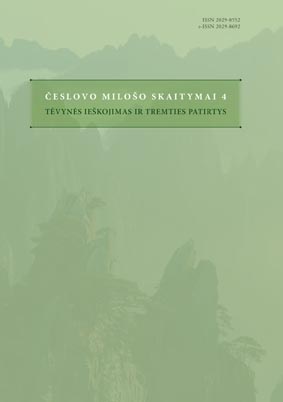Tremtis Adomo Mickevičiaus IR Česlovo Milošo literatūrinėje savimonėje
The Motif of Exile in the Poetic Consciousness of Adam Mickiewicz and Czesław Miłosz
Author(s): Eglė KeturakienėSubject(s): Literary Texts
Published by: Vytauto Didžiojo Universitetas
Keywords: tremtis; piligrimystė; kontrapunktas; atmintis; vaizduotė; šaknies metafora; exile; pilgrimage; counterpoint; memory; imagination; root metaphor
Summary/Abstract: The paper focuses on the literary works and essays by Adam Mickiewicz and Czesław Miłosz through the postcolonial (or culture studies) perspective relying on the writings of Edward B. Side, his article Thoughts on Exile in particular. The author also appeals to the hermeneutic insights of George Steiner and Hans-Georg Gadamer. The object of analysis is the messianic text Księgi narodu polskiego i pielgrzymstwa polskiego by Adam Mickiewicz and Czesław Miłosz essays Rodzinna Europa (Native Realm), Ziemia Ulro (The Land of Ulro), Szukanie ojczyzny (In Search of a Homeland), Piesek przydrożny (Roadside Dog) and his poetry exploring the motifs of poetic pilgrimage, journey, exile and language viewed as motherland. Although the analysed works belong to different epochs and represent various genres it is still possible to compare them on the basis of the reception of Mickiewicz’s writings in the essays composed by Miłosz; discuss the poetic “kinship” between the two authors in the light of common literary tradition marked by the Catholic cultural memory, the recognition of Mickiewicz as a poetic authority and the embodiment of the poetic prototype in Miłosz’s literary consciousness. The common origin from the Great Duchy of Lithuania serves as a uniting link as well as a close yet not identical approach toward the experience of the exile. In his essays Czesław Miłosz provided his own, i.e. Classicist reception of Mickiewicz’s works which promote the principles of an aesthetic distance and moderation. Miłosz does not analyse Mickiewicz’s Księgi narodu in his essays not because of its messianic Romantic vision that was alien to Miłosz’s humanistic attitude although Mickiewicz’s texts unfold the existential conception of the exile familiar to Miłosz’s Biblical attitude toward the experience of exile. The pilgrimage of emigrants in Mickiewicz’s Księgi narodu is conceived as a distinct existential and evangelical apostolic mission. Here the exile is seen as a positive way to preserve the spiritual freedom of the nation. In Miłosz’s essays and his poetry the mature idea that the true motherland is not only the land but also the native language is crystallized. In his essays Szukanie ojczyzny (In Search of a Homeland) and Rodzinna Europa (Native Realm) Miłosz conceives the exile in two perspectives. On the one hand, in Miłosz’s understanding, the existential exile is unavoidable: in human archetypal consciousness the myth of the Earth as a place of Adam’s expulsion from the Garden of Eden is enrooted which reveals the absurd situation of a contemporary man. On the other hand, Miłosz emphasizes the separation from the native land. For him, the loss of home determines the state of alienation and anonymity of the exiled.
Journal: Česlovo Milošo skaitymai
- Issue Year: 2011
- Issue No: 4
- Page Range: 159-167
- Page Count: 9
- Language: Lithuanian

